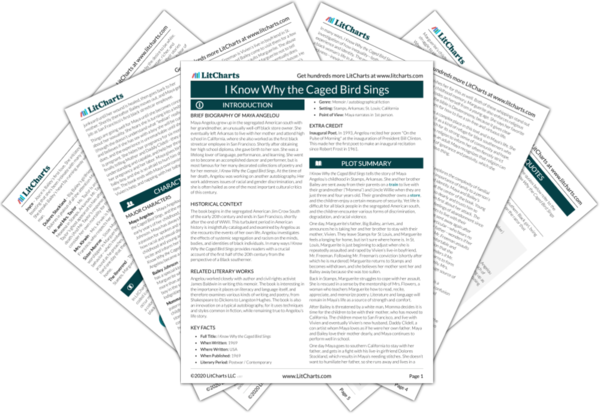Religion also plays a complex role in Marguerite’s upbringing—though the church is a kind of sanctuary for the adults in the book, Marguerite is often intimidated by the church and associates it with punishment.
The importance of religion to black southerners is made clear early in the book. The passion of many adults in Marguerite’s church service embarrasses her; but adults see the church as a sanctuary for their displaced and disenfranchised people. The revivalist meetings bring every black person in the town together—no one ever misses one, and it is a place where blacks affirm their own worth and humanity in a culture and landscape that has oppressed them for generations.
Marguerite and Bailey are raised in this highly religious town and their grandmother instills them with a sense of the importance of faith early on, often through discipline. Marguerite is once punished so thoroughly for laughing in church that for a long time afterwards the memory of it makes her cry. She also uses the phrase “by the way” casually, without knowing that it means “by the way of God” and is therefore a form of taking the Lord’s name in vain, and her Grandmother punishes her for this as well. Both of these whippings stand out in her childhood memory. Marguerite also enforces religious moral codes on herself from a young age. She says her favorite book in the bible is Deuteronomy, because it gives clear instructions for how to live a sin-free and virtuous life.
Religion has a complex place in this text and in Maya’s life. She understands it as a kind of refuge for black southerners who need the church for its strong sense of community and hope. Marguerite uses religion to inform her often fiercely strict moral code, but as an adult Maya recognizes that religion can foster its own kind of ignorance and passivity, which she believes is a dangerous thing.
Religion ThemeTracker

Religion Quotes in I Know Why the Caged Bird Sings
It seemed that the peace of day’s ending was an assurance that the covenant God made with children, Negroes, and the crippled was still in effect.
Let the whitefolks have their money and power and segregation and sarcasm and big houses and schools and lawns like carpets, and books, and mostly—mostly—let them have their whiteness. It was better to be meek and lowly…than to spend eternity frying in the fires of hell.











